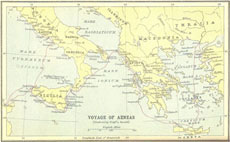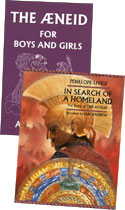I sing of arms and a man may be the greatest way ever to begin an adventure story. Readers need not wonder what kind of book they're about to read, and if you don't like heroes and combat you can be pretty sure right off this isn't going to be your kind of story. The fact that it was written by a Roman is probably a good clue, too.
 The first half of the epic poem in some ways closely parallels Homer's Odyssey, which describes the homeward journey and adventures of Ulysses, king of Ithaca. In it, Aeneas (a Trojan warrior and son of Venus/Aphrodite) flees the sacked city of Ilium and goes in search of a new homeland, encountering many of the monsters Ulysses had already evaded.
The first half of the epic poem in some ways closely parallels Homer's Odyssey, which describes the homeward journey and adventures of Ulysses, king of Ithaca. In it, Aeneas (a Trojan warrior and son of Venus/Aphrodite) flees the sacked city of Ilium and goes in search of a new homeland, encountering many of the monsters Ulysses had already evaded.
In the second half of The Aeneid, Aeneas makes good on his prophetic destiny to found Rome by engaging in a large-scale war of establishment in Italy, where he finally ends up after his travels. Because the poet Virgil was commissioned by the emperor Caesar Augustus to write The Aeneid, there are many parallels between the emperor and Aeneas.
History knows Augustus primarily as the ruler of the Roman Empire at the time of Jesus' birth, as the nephew and heir of the great Julius Caesar, and as the first Roman ruler to use messianic language to describe his reign and godlike status. Given the circumstances, you'd think Virgil's poem was just a shameless homage: oddly enough, it isn't.
That's not to say there aren't parallels. According to Virgil and Roman tradition, Aeneas was the founder of Rome; Augustus was considered by many to be the re-founder of Rome. Aeneas is often treated as a saviour in the poem; Augustus spoke of himself in the same way. Both Virgil and Augustus operated under a sense of prophetic fulfillment.
Despite these similarities, there is an implicit cautionary tale embedded in The Aeneid. Aeneas was brave, determined, intelligent, and pious, all things that could also be said of Augustus. But by the end of his saga, Aeneas' resolve began to crumble, his moral strength to give out, his certainty to wane.
 Is Virgil warning Augustus about the dangers of hubris, about how too much pride and power will result not in glory and honor but in madness and death? Possibly. Such warnings wouldn't be out of place in the ancient world, nor without precedent, and Virgil is known by his other literary work as a poet dedicated primarily to the truth.
Is Virgil warning Augustus about the dangers of hubris, about how too much pride and power will result not in glory and honor but in madness and death? Possibly. Such warnings wouldn't be out of place in the ancient world, nor without precedent, and Virgil is known by his other literary work as a poet dedicated primarily to the truth.
Perhaps this is why Dante chose him as a guide through the lower depths in his Divine Comedy. At the same time, many scholars argue it's impossible to tell what Virgil was trying to say, and that his conflict between praising and condemning Augustus/Aeneas renders his whole point moot.
That seems too postmodern, though. Virgil was a premodern soul who believed in absolute truths and standards, and who was unafraid to hold even his emperor to them. A better option is simply that Virgil was a realist, and while he admired Aeneas and Augustus, he also understood the dangers inherent in greatness.
But The Aeneid isn't just an intellectual text for academics to argue about. First and foremost, it's an adventure story, as action-packed as any Schwarzenegger or Statham movie, with way better lines. It's also the only place in ancient literature you'll encounter the story of the Trojan Horse, that devious move on the part of the Greeks to defeat Ilium and its inhabitants.
Like any great adventure story, though, there's more to the poem than monsters and battles. Aeneas is far from a static hero, developing and changing as his experiences shape his thoughts, attitudes, and personality. And for all you tender hearts out there, the romance of Aeneas and Dido is one of the sweetest and most tragic in literature.
 Books like this don't become classics for no reason. The Aeneid, perhaps more than any other ancient epic, illustrates the common human experience. Why do we still read it two thousand years later? Because we're all Aeneas searching for a homeland, lost in hostile territory, looking with Virgil to those who've gone before for directions.
Books like this don't become classics for no reason. The Aeneid, perhaps more than any other ancient epic, illustrates the common human experience. Why do we still read it two thousand years later? Because we're all Aeneas searching for a homeland, lost in hostile territory, looking with Virgil to those who've gone before for directions.
Review by C. Hollis Crossman
C. Hollis Crossman used to be a child. Now he's a husband and father who loves church, good food, and weird stuff. He might be a mythical creature, but he's definitely not a centaur. Read more of his reviews
here.
Children's Versions:
 If you're hoping to introduce your younger students to The Aeneid, we recommend starting with an adaptation for children. We carry two versions which we heartily recommend. The Aeneid for Boys and Girls, by Alfred J. Church, is one such option. This version was written in the late 19th century and has the advantage of being available online for free.
If you're hoping to introduce your younger students to The Aeneid, we recommend starting with an adaptation for children. We carry two versions which we heartily recommend. The Aeneid for Boys and Girls, by Alfred J. Church, is one such option. This version was written in the late 19th century and has the advantage of being available online for free.
Penelope Lively's 2006 retelling, In Search of a Homeland, is accompanied by vivid pencil and watercolor illustrations by Ian Andrew. Lively's prose is compelling--her last few lines nearly do Homer's original justice:
"The Trojan's fury surged once more. "Die! It is Pallas who exacts revenge!" He sank his blade into the man at his feet. The limbs of Turnus froze in death, and his angry soul fled groaning to the underworld."
Andrew's loose, fluid illustrations are reminiscent of the contents of a sketchbook and suit the text well. We carry this in hardcover, and believe it will take its place alongside Rosemary Sutcliff's classic retellings of Homer's Iliad and Odyssey.
About the Translations:

 Virgil wrote The Aeneid between 29 and 19 BC. Not much is known about him, but we do know that he was born in 70 BC in a small village near Mantua, and did not become a Roman citizen until he was a young man. On his deathbed, Virgil was deeply unhappy with The Aeneid, which had been commissioned by Augustus as a national poem glorifying his empire. His last request that it be burned was ignored, and today we have a number of translations of this grand adventure story to enjoy (we can't find a complete list, but believe there to be more than 30 published in English).
Virgil wrote The Aeneid between 29 and 19 BC. Not much is known about him, but we do know that he was born in 70 BC in a small village near Mantua, and did not become a Roman citizen until he was a young man. On his deathbed, Virgil was deeply unhappy with The Aeneid, which had been commissioned by Augustus as a national poem glorifying his empire. His last request that it be burned was ignored, and today we have a number of translations of this grand adventure story to enjoy (we can't find a complete list, but believe there to be more than 30 published in English).
We carry three translations here at Exodus Books. Two are set in verse, one is prose. (Click here to view an exclusive comparison chart which features five selections from the poem).
Robert Fagle’s 2006 translation is highly praised and seems to be the current favorite among critics. Fagles himself was a poet, and his deep appreciation for British and American poetry gives him a unique perspective when translating.
Poet and novelist Brad Leithauser gives an excellent explanation of the differences between the Fagles and Fitzgerald in one of his New York Times reviews. Fagles changed Virgil’s hexameter into long lines of free verse, which Leithauser says results in the “ghost of a hexameter serving as loose armature.”
Fitzgerald’s 1981 rendering has shorter lines, which Leithauser claims convey the more passionate, action filled parts of the story better. Still, many scholars believe Fagle's faithfulness to the Latin text makes his an overall better rendition. Peter Leithart's Heroes of the City of Man cites Fitzgerald's version of the book and Veritas Press uses it in Omnibus I. Teaching the Classics uses the Fagles translation in the Reading Roadmaps packages.
David West, Professor Emeritus at the University of Newcastle upon Tyne, notes at the beginning of his 1990 prose version that the point of his translation was to "write readable English which does honour to the richness and sublimity of Virgil's language." West respects Jackson Knight's "ruling prose version," but believes it contains too much dated language. West believes good prose versions of The Aeneid need to exist, so that Virgil's work will become more widely read. His translation is used by the Memoria Press Literature Package.
Additional Notes:
 We highly recommend Bernard Knox's introduction at the beginning of Fagles’ version. Knox approaches The Aeneid not as a dead piece of political propaganda, but a powerful poem which can give us insight into Italian history, Dante's Divine Comedy, and the nature of war. Knox’s appreciation is deep and personal: as a young U.S. Army captain attacking German strongholds in Italy, he relates how he once stumbled into an old farmhouse in the Italian countryside and found a copy of Virgil lying on the floor.
We highly recommend Bernard Knox's introduction at the beginning of Fagles’ version. Knox approaches The Aeneid not as a dead piece of political propaganda, but a powerful poem which can give us insight into Italian history, Dante's Divine Comedy, and the nature of war. Knox’s appreciation is deep and personal: as a young U.S. Army captain attacking German strongholds in Italy, he relates how he once stumbled into an old farmhouse in the Italian countryside and found a copy of Virgil lying on the floor.
There are other translations of The Aeneid, and it will likely remain a favorite translation project of Latin scholars for centuries to come. Whichever version you choose to read, we hope you'll enjoy the epic story.
Did you find this review helpful?